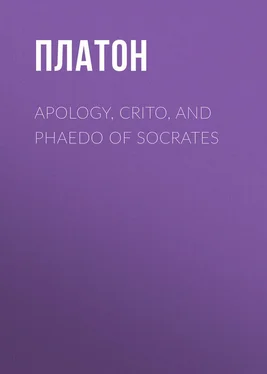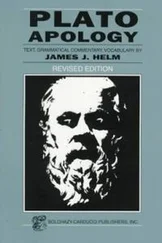Платон - Apology, Crito, and Phaedo of Socrates
Здесь есть возможность читать онлайн «Платон - Apology, Crito, and Phaedo of Socrates» — ознакомительный отрывок электронной книги совершенно бесплатно, а после прочтения отрывка купить полную версию. В некоторых случаях можно слушать аудио, скачать через торрент в формате fb2 и присутствует краткое содержание. Жанр: Философия, foreign_antique, foreign_prose, на английском языке. Описание произведения, (предисловие) а так же отзывы посетителей доступны на портале библиотеки ЛибКат.
- Название:Apology, Crito, and Phaedo of Socrates
- Автор:
- Жанр:
- Год:неизвестен
- ISBN:нет данных
- Рейтинг книги:4 / 5. Голосов: 1
-
Избранное:Добавить в избранное
- Отзывы:
-
Ваша оценка:
- 80
- 1
- 2
- 3
- 4
- 5
Apology, Crito, and Phaedo of Socrates: краткое содержание, описание и аннотация
Предлагаем к чтению аннотацию, описание, краткое содержание или предисловие (зависит от того, что написал сам автор книги «Apology, Crito, and Phaedo of Socrates»). Если вы не нашли необходимую информацию о книге — напишите в комментариях, мы постараемся отыскать её.
Apology, Crito, and Phaedo of Socrates — читать онлайн ознакомительный отрывок
Ниже представлен текст книги, разбитый по страницам. Система сохранения места последней прочитанной страницы, позволяет с удобством читать онлайн бесплатно книгу «Apology, Crito, and Phaedo of Socrates», без необходимости каждый раз заново искать на чём Вы остановились. Поставьте закладку, и сможете в любой момент перейти на страницу, на которой закончили чтение.
Интервал:
Закладка:
12. Come, then, Melitus, tell me, do you not consider it of the greatest importance that the youth should be made as virtuous as possible?
Mel. I do.
Socr. Well, now, tell the judges who it is that makes them better, for it is evident that you know, since it concerns you so much; for, having detected me in corrupting them, as you say, you have cited me here, and accused me: come, then, say, and inform the judges who it is that makes them better. Do you see, Melitus, that you are silent, and have nothing to say? But does it not appear to you to be disgraceful, and a sufficient proof of what I say, that you never took any concern about the matter? But tell me, friend, who makes them better?
Mel. The laws.
Socr. I do not ask this, most excellent sir, but what man, who surely must first know this very thing, the laws?
Mel. These, Socrates, the judges.
Socr. How say you, Melitus? Are these able to instruct the youth, and make them better?
Mel. Certainly.
Socr. Whether all, or some of them, and others not?
Mel. All.
Socr. You say well, by Juno! and have found a great abundance of those that confer benefit. But what further? Can these hearers make them better, or not?
Mel. They, too, can.
Socr. And what of the senators?
Mel. The senators, also.
Socr. But, Melitus, do those who attend the public assemblies corrupt the younger men? or do they all make them better?
Mel. They too.
Socr. All the Athenians, therefore, as it seems, make them honorable and good, except me; but I alone corrupt them. Do you say so?
Mel. I do assert this very thing.
Socr. You charge me with great ill-fortune. But answer me: does it appear to you to be the same, with respect to horses? Do all men make them better, and is there only some one that spoils them? or does quite the contrary of this take place? Is there some one person who can make them better, or very few; that is, the trainers? But if the generality of men should meddle with and make use of horses, do they spoil them? Is not this the case, Melitus, both with respect to horses and all other animals? It certainly is so, whether you and Anytus deny it or not. For it would be a great good-fortune for the youth if only one person corrupted, and the rest benefited them. However, Melitus, you have sufficiently shown that you never bestowed any care upon youth; and you clearly evince your own negligence, in that you have never paid any attention to the things with respect to which you accuse me.
13. Tell us further, Melitus, in the name of Jupiter, whether is it better to dwell with good or bad citizens? Answer, my friend; for I ask you nothing difficult. Do not the bad work some evil to those that are continually near them, but the good some good?
Mel. Certainly.
Socr. Is there any one that wishes to be injured rather than benefited by his associates? Answer, good man; for the law requires you to answer. Is there any one who wishes to be injured?
Mel. No, surely.
Socr. Come, then, whether do you accuse me here, as one that corrupts the youth, and makes them more depraved, designedly or undesignedly?
Mel. Designedly, I say.
Socr. What, then, Melitus, are you at your time of life so much wiser than I at my time of life, as to know that the evil are always working some evil to those that are most near to them, and the good some good; but I have arrived at such a pitch of ignorance as not to know that if I make any one of my associates depraved, I shall be in danger of receiving some evil from him; and yet I designedly bring about this so great evil, as you say? In this I can not believe you, Melitus, nor do I think would any other man in the world. But either I do not corrupt the youth, or, if I do corrupt them, I do it undesignedly: so that in both cases you speak falsely. But if I corrupt them undesignedly, for such involuntary offenses it is not usual to accuse one here, but to take one apart, and teach and admonish one. For it is evident that if I am taught, I shall cease doing what I do undesignedly. But you shunned me, and were not willing to associate with and instruct me; but you accuse me here, where it is usual to accuse those who need punishment, and not instruction.
14. Thus, then, O Athenians! this now is clear that I have said; that Melitus never paid any attention to these matters, much or little. However, tell us, Melitus, how you say I corrupt the youth? Is it not evidently, according to the indictment which you have preferred, by teaching them not to believe in the gods in whom the city believes, but in other strange deities? Do you not say that, by teaching these things, I corrupt the youth?
Mel. Certainly I do say so.
Socr. By those very gods, therefore, Melitus, of whom the discussion now is, speak still more clearly both to me and to these men. For I can not understand whether you say that I teach them to believe that there are certain gods (and in that case I do believe that there are gods, and am not altogether an atheist, nor in this respect to blame), not, however, those which the city believes in, but others; and this it is that you accuse me of, that I introduce others. Or do you say outright that I do not myself believe that there are gods, and that I teach others the same?
Mel. I say this: that you do not believe in any gods at all.
Socr. O wonderful Melitus, how come you to say this? Do I not, then, like the rest of mankind, believe that the sun and moon are gods?
Mel. No, by Jupiter, O judges! for he says that the sun is a stone, and the moon an earth.
Socr. You fancy that you are accusing Anaxagoras, my dear Melitus, and thus you put a slight on these men, and suppose them to be so illiterate as not to know that the books of Anaxagoras of Clazomene are full of such assertions. And the young, moreover, learn these things from me, which they might purchase for a drachma, at most, in the orchestra, and so ridicule Socrates, if he pretended they were his own, especially since they are so absurd? I ask then, by Jupiter, do I appear to you to believe that there is no god?
Mel. No, by Jupiter, none whatever.
Socr. You say what is incredible, Melitus, and that, as appears to me, even to yourself. For this man, O Athenians! appears to me to be very insolent and intemperate and to have preferred this indictment through downright insolence, intemperance, and wantonness. For he seems, as it were, to have composed an enigma for the purpose of making an experiment. Whether will Socrates the wise know that I am jesting, and contradict myself, or shall I deceive him and all who hear me? For, in my opinion, he clearly contradicts himself in the indictment, as if he should say, Socrates is guilty of wrong in not believing that there are gods, and in believing that there are gods. And this, surely, is the act of one who is trifling.
15. Consider with me now, Athenians, in what respect he appears to me to say so. And do you, Melitus, answer me; and do ye, as I besought you at the outset, remember not to make an uproar if I speak after my usual manner.
Is there any man, Melitus, who believes that there are human affairs, but does not believe that there are men? Let him answer, judges, and not make so much noise. Is there any one who does not believe that there are horses, but that there are things pertaining to horses? or who does not believe that there are pipers, but that there are things pertaining to pipes? There is not, O best of men! for since you are not willing to answer, I say it to you and to all here present. But answer to this at least: is there any one who believes that there are things relating to demons, but does not believe that there are demons?
Читать дальшеИнтервал:
Закладка:
Похожие книги на «Apology, Crito, and Phaedo of Socrates»
Представляем Вашему вниманию похожие книги на «Apology, Crito, and Phaedo of Socrates» списком для выбора. Мы отобрали схожую по названию и смыслу литературу в надежде предоставить читателям больше вариантов отыскать новые, интересные, ещё непрочитанные произведения.
Обсуждение, отзывы о книге «Apology, Crito, and Phaedo of Socrates» и просто собственные мнения читателей. Оставьте ваши комментарии, напишите, что Вы думаете о произведении, его смысле или главных героях. Укажите что конкретно понравилось, а что нет, и почему Вы так считаете.












